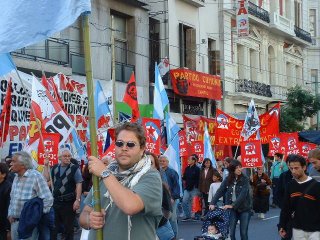Econ uno-O-uno

We have managed to wander through unfathomable scenery, encounter unforgettably foreign friends and often find ourselves embracing all that traveling affords. Yes, it's a fact, I've taken the backseat when it comes to composing our emails. I've accepted that Sarah not only can type it out 5 times faster then me but she also has quite the commanding adjective repertoire. I'm the photo guy and have accepted this willingly, despite the 3-4hr commitment necessary to save/edit/post the photos from cyber cafes.
While wandering, Sarah and I often struggle with our obvious privileges and opportunities in relation to the destinations and people we encounter. The current political, social and economic crisis plaguing Argentina was something completely different. I'm sure the U.S. media has shown the long lines at banks, the violent frustration of the masses of poor and middle classes, and touched on the Argentine governments attempts to please the IMF. Reading the Buenos Aires Herald (a fantastic English paper in Argentina) and having limited discussions with Argentines, has helped us begin to comprehend the horrible struggle this country has faced since the end of last year. Once Argentina defaulted on loans at the end of 2001 several 'caretaker administrations' held the office of president. The current president, Eduardo Dulhade, took the office in December. He quickly ended the 11yr old fixed Peso to Dollar ratio. To prevent the banking system from collapsing, he instituted the controversial (ruled in many courts unconstitutional) Corralito bond restrictions. Argentina had a growing middle class, built on false promises and corrupt government officials. The Corrolito crippled this class by freezing bank accounts and converting all amounts held in Dollars to Pesos. The Peso was set a float in the markets and account holders lost 70% of their holdings within weeks. The Corralito also restricted withdrawals to 300 Pesos per week. The Supreme Court (which has it's own problems with 9 judges currently facing impeachment due to corruption charges), has repeatedly ruled in favor of account holders and forced banks to return all funds. On April 18, when over 2.3 billon pesos had been withdrawn, the Government forced the closure of all banks for a period of 6 days. Many restaurants and retail shops refused to take Credit Cards and all ATMs were out of cash. When the banks finally opened, yet another bill had been passed. The 'plug bill', forced all court injunctions to go through the central bank and thus creates a waiting period up to 20 days before funds are returned. This simply gives the Government more time to find a solution or appease the IMF.
We witnessed different protests every day in Buenos Aires. The banks are covered with metal sheets that bare witness to the weekly banging on the doors and an abundance of political graffiti. I considered it fortunate that we were in Buenos Aires on May 1st (Labor Day, the Workers Day). We found the leftist and union based protesters in one part of the city and the upper-class community lounging in the park over live music and ice cream. I realized when I posted the pictures, I had not taken a single shot of the relaxing masses in the park and had only collected several protest images. I suppose that I failed to convey the daily realities of routine and managed to focus only on the flames and frustration.(a common media error) The couple we met and became friends with from Buenos Aires, Lola and Gato, shared with us many perspectives about their own situations. They both were fortunate to have stable jobs and made enough money to afford to travel. The devaluation of their currency forced them to see more of Argentina rather then foreign lands, something they both had the luxury to do in the past. They talked of wanting to get married soon and that the crisis might put that off a bit.(Gato went on to joke that he was awkwardly thankful for this!...we all chuckled at the global infliction called "cold feet".) I think that Gato summed it up best when he said he loved Argentina but was saddened to think that Argentina, now, might not provide the opportunities for his dreams to become reality. It's hard to explain that the exchange rate, crippling a country, affords us a cheaper opportunity without sounding like "come to Argentina it's now ON SALE!". We try and make ourselves feel better by suggesting that when we spend our dollars here we are actually helping the people not taking advantage of them.
All in all, most people we encounter feel that this is the time for Argentines to take responsibility for their government and country, and are optimistic despite some realities.
Traveling with a conscience,
Dan (and Sarah)



0 Comments:
Post a Comment
<< Home